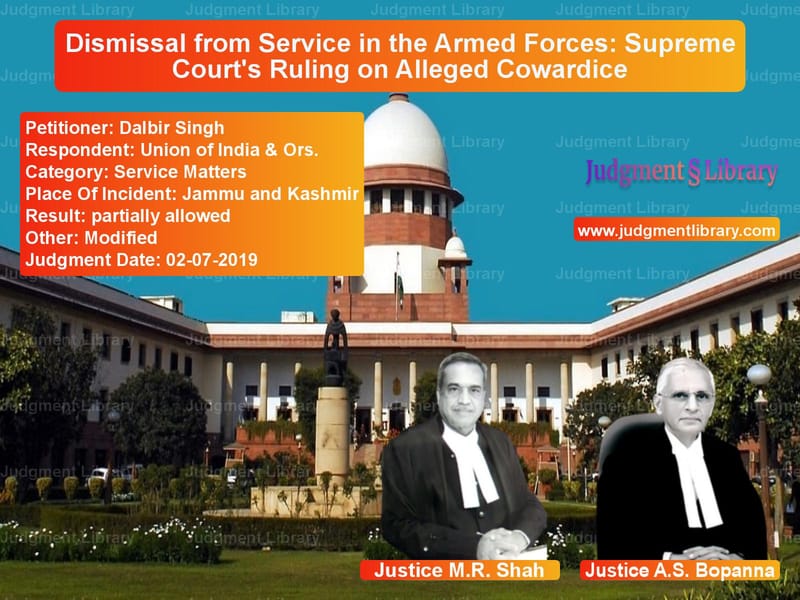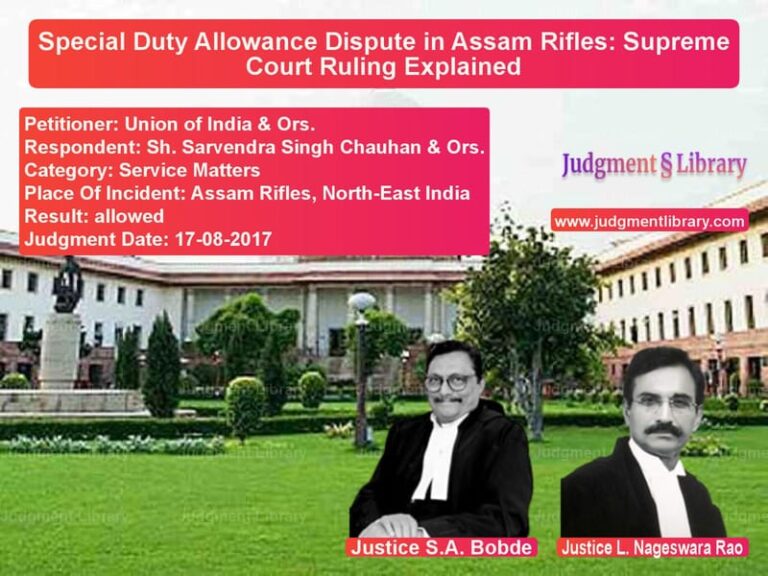Dismissal from Service in the Armed Forces: Supreme Court’s Ruling on Alleged Cowardice
The case of Dalbir Singh v. Union of India & Ors. revolves around the dismissal of a soldier from the Indian Army for alleged cowardice during a military operation. The Supreme Court was tasked with determining whether the decision of the Summary General Court Martial (SGCM) and the Armed Forces Tribunal (AFT) in upholding the dismissal and imprisonment of the appellant was justified.
Background of the Case
The appellant, Dalbir Singh, was enrolled in the Indian Army on 06.04.1999 and was serving in the 3 Rashtriya Rifles Battalion in 2006. On 13.08.2006, a military operation was launched in the village of Darigidiyan in Jammu and Kashmir. The appellant was part of a team ordered to carry out a cordon and search operation.
During the operation, militants fired upon the soldiers. The appellant was positioned at the Light Machine Gun (LMG) post along with his fellow soldier, Sapper Gurmail Singh. According to the prosecution, when the militants fired at their position, the appellant abandoned his post, failed to return fire, and jumped across a stone wall to escape. In the attack, Sapper Gurmail Singh was killed, and the militants took away the LMG. The appellant suffered a bullet injury to his leg.
Based on these allegations, the appellant was charged with cowardice and dereliction of duty under Section 34(c) of the Army Act. Following a Summary General Court Martial (SGCM) proceeding, he was sentenced to:
- Six months of rigorous imprisonment
- Dismissal from service
Dalbir Singh challenged this order before the Armed Forces Tribunal (AFT), which upheld the SGCM’s ruling. He then appealed to the Supreme Court.
Petitioner’s Arguments
Dalbir Singh, represented by his counsel, argued:
- The charges against him were not sufficiently proven.
- He had received a gunshot wound in the incident, indicating that he was engaged in the operation and had not fled.
- Several prosecution witnesses testified that he was a good soldier and had participated in previous operations.
- The court martial proceedings did not adequately consider his explanation for his actions.
Respondent’s Arguments
The Union of India countered:
- The appellant abandoned his position during an active engagement with militants.
- Despite carrying an AK-47 rifle and a pistol, he did not fire back at the militants.
- His inaction directly led to the militants breaking the cordon, killing his fellow soldier, and escaping with a crucial weapon.
- The Armed Forces Tribunal correctly upheld the SGCM’s ruling based on the evidence.
Supreme Court’s Observations
The Supreme Court examined the evidence presented during the court martial and the Tribunal’s reasoning. The key findings included:
- The appellant admitted to leaving his post and jumping over a stone wall.
- Even if he was injured, he did not fire his weapon in response to the attack.
- The appellant’s claim that his weapon malfunctioned was unsupported by any evidence.
- The military relies on discipline and bravery under fire; failure to perform in combat situations can justify dismissal.
The Court observed:
“In matters of military discipline, a soldier’s duty is to stand firm in the face of the enemy. Abandoning a defensive position during an engagement can have severe consequences. While past service records may be considered in some cases, an act of cowardice in a combat situation cannot be excused.”
Final Judgment
The Supreme Court upheld the appellant’s dismissal from service but set aside his six-month imprisonment. The Court ruled:
- The dismissal from service was justified, considering the gravity of the incident.
- However, given the lapse of time and the appellant’s injury, the six-month prison sentence need not be enforced.
Impact of the Judgment
This ruling has significant implications for military law and discipline:
- Reaffirms the importance of maintaining discipline in the armed forces.
- Clarifies that deserting a post during combat can justify dismissal.
- Recognizes past service records but does not allow them to override an act of cowardice.
- Distinguishes between dismissal from service and additional punitive measures like imprisonment.
Conclusion
The Supreme Court’s decision in this case underscores the strict standards expected of military personnel. While the appellant was given some relief from imprisonment, the judgment upholds the importance of discipline, responsibility, and bravery in the armed forces. This ruling ensures that soldiers understand the seriousness of their duties and the consequences of failing to perform in critical situations.
Petitioner Name: Dalbir Singh.Respondent Name: Union of India & Ors..Judgment By: Justice M.R. Shah, Justice A.S. Bopanna.Place Of Incident: Jammu and Kashmir.Judgment Date: 02-07-2019.
Don’t miss out on the full details! Download the complete judgment in PDF format below and gain valuable insights instantly!
Download Judgment: Dalbir Singh vs Union of India & Ors Supreme Court of India Judgment Dated 02-07-2019.pdf
Direct Downlaod Judgment: Direct downlaod this Judgment
See all petitions in Disciplinary Proceedings
See all petitions in Termination Cases
See all petitions in Public Sector Employees
See all petitions in Judgment by Mukeshkumar Rasikbhai Shah
See all petitions in Judgment by A. S. Bopanna
See all petitions in partially allowed
See all petitions in Modified
See all petitions in supreme court of India judgments July 2019
See all petitions in 2019 judgments
See all posts in Service Matters Category
See all allowed petitions in Service Matters Category
See all Dismissed petitions in Service Matters Category
See all partially allowed petitions in Service Matters Category







